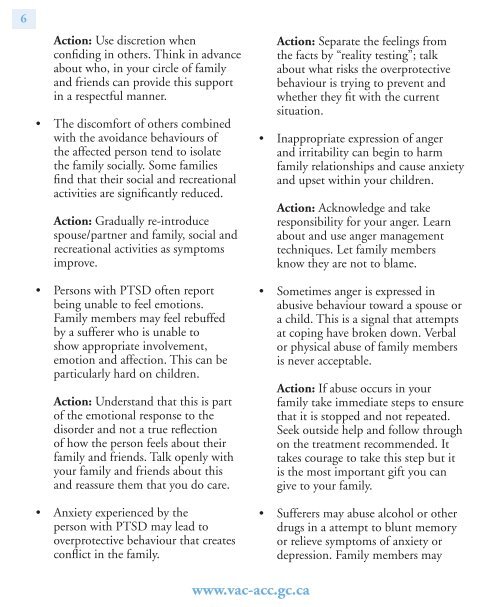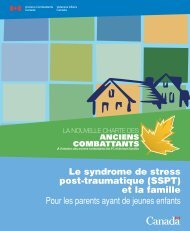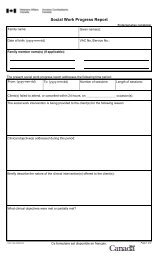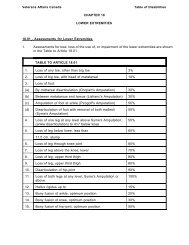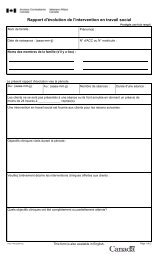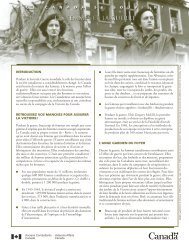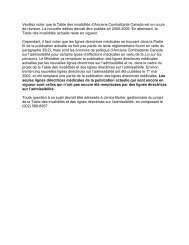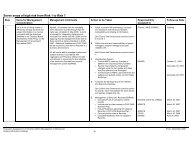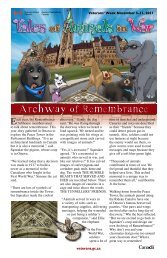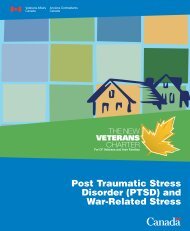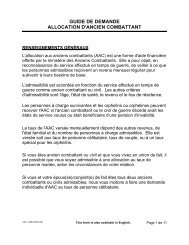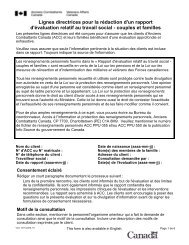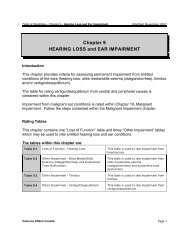Post-Traumatic Stress Disorder (PTSD) and the Family for Parents ...
Post-Traumatic Stress Disorder (PTSD) and the Family for Parents ...
Post-Traumatic Stress Disorder (PTSD) and the Family for Parents ...
Create successful ePaper yourself
Turn your PDF publications into a flip-book with our unique Google optimized e-Paper software.
Action: Use discretion when<br />
confiding in o<strong>the</strong>rs. Think in advance<br />
about who, in your circle of family<br />
<strong>and</strong> friends can provide this support<br />
in a respectful manner.<br />
• The discom<strong>for</strong>t of o<strong>the</strong>rs combined<br />
with <strong>the</strong> avoidance behaviours of<br />
<strong>the</strong> affected person tend to isolate<br />
<strong>the</strong> family socially. Some families<br />
find that <strong>the</strong>ir social <strong>and</strong> recreational<br />
activities are significantly reduced.<br />
Action: Gradually re-introduce<br />
spouse/partner <strong>and</strong> family, social <strong>and</strong><br />
recreational activities as symptoms<br />
improve.<br />
• Persons with <strong>PTSD</strong> often report<br />
being unable to feel emotions.<br />
<strong>Family</strong> members may feel rebuffed<br />
by a sufferer who is unable to<br />
show appropriate involvement,<br />
emotion <strong>and</strong> affection. This can be<br />
particularly hard on children.<br />
Action: Underst<strong>and</strong> that this is part<br />
of <strong>the</strong> emotional response to <strong>the</strong><br />
disorder <strong>and</strong> not a true reflection<br />
of how <strong>the</strong> person feels about <strong>the</strong>ir<br />
family <strong>and</strong> friends. Talk openly with<br />
your family <strong>and</strong> friends about this<br />
<strong>and</strong> reassure <strong>the</strong>m that you do care.<br />
• Anxiety experienced by <strong>the</strong><br />
person with <strong>PTSD</strong> may lead to<br />
overprotective behaviour that creates<br />
conflict in <strong>the</strong> family.<br />
Action: Separate <strong>the</strong> feelings from<br />
<strong>the</strong> facts by “reality testing”; talk<br />
about what risks <strong>the</strong> overprotective<br />
behaviour is trying to prevent <strong>and</strong><br />
whe<strong>the</strong>r <strong>the</strong>y fit with <strong>the</strong> current<br />
situation.<br />
• Inappropriate expression of anger<br />
<strong>and</strong> irritability can begin to harm<br />
family relationships <strong>and</strong> cause anxiety<br />
<strong>and</strong> upset within your children.<br />
Action: Acknowledge <strong>and</strong> take<br />
responsibility <strong>for</strong> your anger. Learn<br />
about <strong>and</strong> use anger management<br />
techniques. Let family members<br />
know <strong>the</strong>y are not to blame.<br />
• Sometimes anger is expressed in<br />
abusive behaviour toward a spouse or<br />
a child. This is a signal that attempts<br />
at coping have broken down. Verbal<br />
or physical abuse of family members<br />
is never acceptable.<br />
Action: If abuse occurs in your<br />
family take immediate steps to ensure<br />
that it is stopped <strong>and</strong> not repeated.<br />
Seek outside help <strong>and</strong> follow through<br />
on <strong>the</strong> treatment recommended. It<br />
takes courage to take this step but it<br />
is <strong>the</strong> most important gift you can<br />
give to your family.<br />
• Sufferers may abuse alcohol or o<strong>the</strong>r<br />
drugs in a attempt to blunt memory<br />
or relieve symptoms of anxiety or<br />
depression. <strong>Family</strong> members may<br />
www.vac-acc.gc.ca


